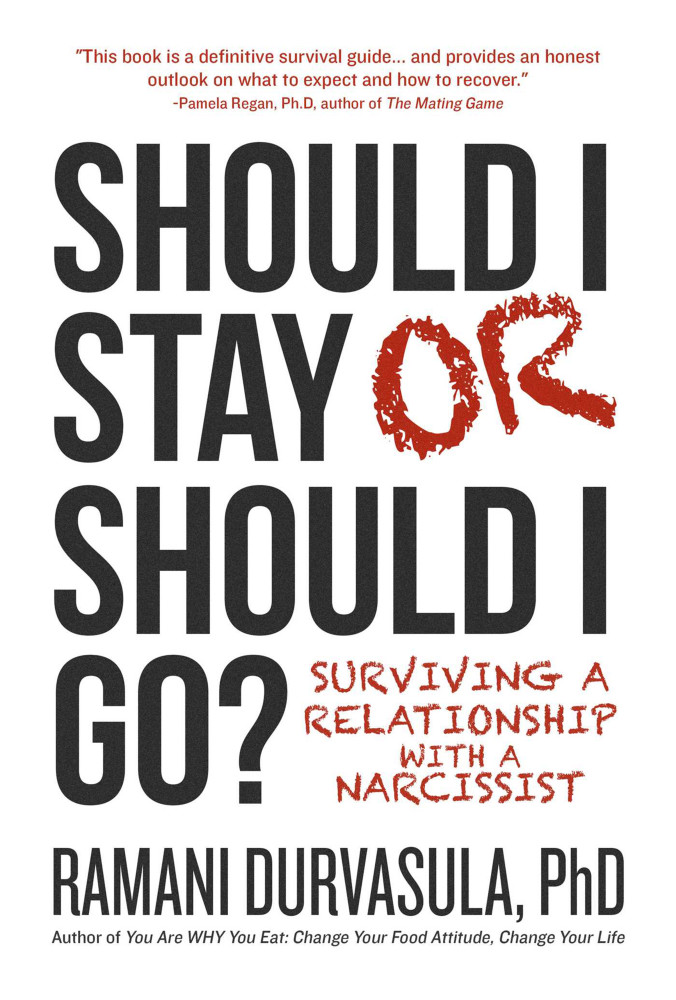By Richard Asa
Chicago Tribune.
WWR Article Summary (tl;dr) We have a sincere focus here at WWR with empowering women in all facets of their lives. This of course includes mental health. Sometimes, a toxic relationship can drain you of much more than your creativity. So when is it time to go? Clinical psychologist Ramani Durvasula takes a look at that very question in her new book “Should I Stay or Should I Go: Surviving a Relationship With a Narcissist.”
Chicago Tribune
Clinical psychologist Ramani Durvasula is the author of the new book “Should I Stay or Should I Go: Surviving a Relationship With a Narcissist.” Durvasula says the person on the receiving end might believe that “love conquers all,” but she calls that a myth. Rather, it leads to partners enduring unnecessary emotional abuse. Durvasula considers narcissism a “modern epidemic.” She says, “If your significant other can be charismatic and charming one moment and leave you feeling unsettled and disappointed the next, you may be involved with a narcissist.”
Durvasula also is a professor of psychology at California State University.
Following is an edited version of an interview with her.
Q. Narcissism seems like the new “it” word regarding relationships. What is it about narcissism, and why should we care?
A. Narcissism is a misunderstood word, with lots of people believing it is about “self love.” It is actually about insecurity and lots of grandiose behavior on the outside to offset the empty inside. Narcissism is not to be confused with self-confidence. Self-confident people sometimes put their own needs first, advocate for themselves and know their own self worth. Narcissists lack empathy, are entitled, and because they are so insecure and empty, can’t just settle for blowing their own horn, but have to insult and bring others down at the same time.
Q: Narcissists are often quite successful, so doesn’t that mean they would also make great partners?
A. Narcissism is, sadly, often associated with success. The traits of narcissism, selfishness, grandiosity, entitlement, disrespect, can often result in a quick ascendancy up the corporate ladder, and a willingness to throw anyone under the bus to get ahead. Narcissists are masterful at compartmentalization, so they can work with precise focus and not be distracted by the issues that others face such as a sick child or family issues. That cold compartmentalization may get the job done, but it is not good for matters of the heart.
Q: What happens in a narcissistic relationship?
A. These relationships damage people from the inside out. Too often, people in relationships with narcissists find themselves running themselves ragged trying to please their “unappeasable” narcissistic partner. They can find themselves feeling like they are “not enough” and overtaken with self-doubt. People in these relationships can become isolated and wither under the criticism and carelessness of their narcissistic partners.
Q: So it seems like the only answer is to get out of that situation, why bother staying in this kind of relationship?
A. It’s not that simple. Obviously relationships are about history, shared experiences, nostalgia, finances, children, religion, culture, dependency, and it is not always that easy to just leave, even if things are getting toxic. I titled the book “Should I Stay or Should I Go” because some people want or need to stay, and I didn’t feel that they should just become a human sacrifice if they stay. The book offers guidelines and actionable tips on how to manage expectations if you are in a narcissistic relationship.
Q: What happens if you decide to leave a narcissistic relationship?
A. Short answer, it ain’t going to be pretty! Breaking up with a narcissist is like hugging a porcupine, it is going to hurt, and it is hard to let go. Narcissists do not like to be left; it bruises their egos. Lots of issues come up, including expensive, messy divorces, the need for an escape plan, preparation for having your name publicly besmirched, relentless emails, texts and messages, and ongoing psychological battering. Despite all of this, the vast majority of folks who leave these relationships report feeling a sense of “relief”, even if their lives are more financially difficult, or they lose friends and family or they have to deal with the ongoing rants.
Q. Is narcissism on the rise?
A. There is some debate about this. There are some researchers who believe our social media/reality TV-infused world has left us as selfie-obsessed, and more concerned with validation and superficiality than depth. There are others who argue that things haven’t changed that much and that teenagers have always been narcissistic but grow out of it. The right answer is likely somewhere in the middle. Our increasing reliance on technology and devices has made us less facile in good old human interaction, and multitasking has drawn our resources away from empathy and presence.
Q. Does this book have relevance for other relationships?
A. It is relevant to all narcissistic relationships, parents, children, siblings, friends, co-workers, bosses. The patterns and principles remain the same. Intimate relationships colored by narcissism often take a greater toll on people because it is uniquely painful to be neglected, criticized and ignored (and sometimes abused) by your “person” and that is the reason I trained my lens on that specific dynamic. Whether spouse, friend, boss or sister, managing expectations and not waiting for a miracle applies in all cases.














































































































































































































































































































































































